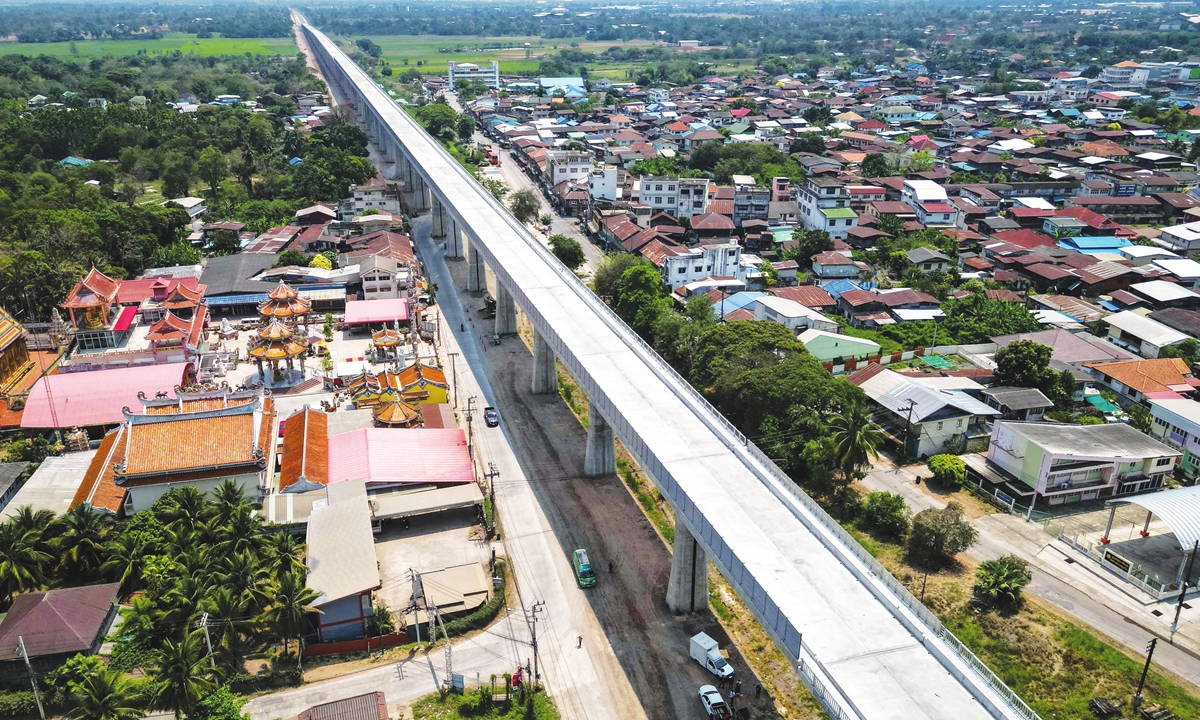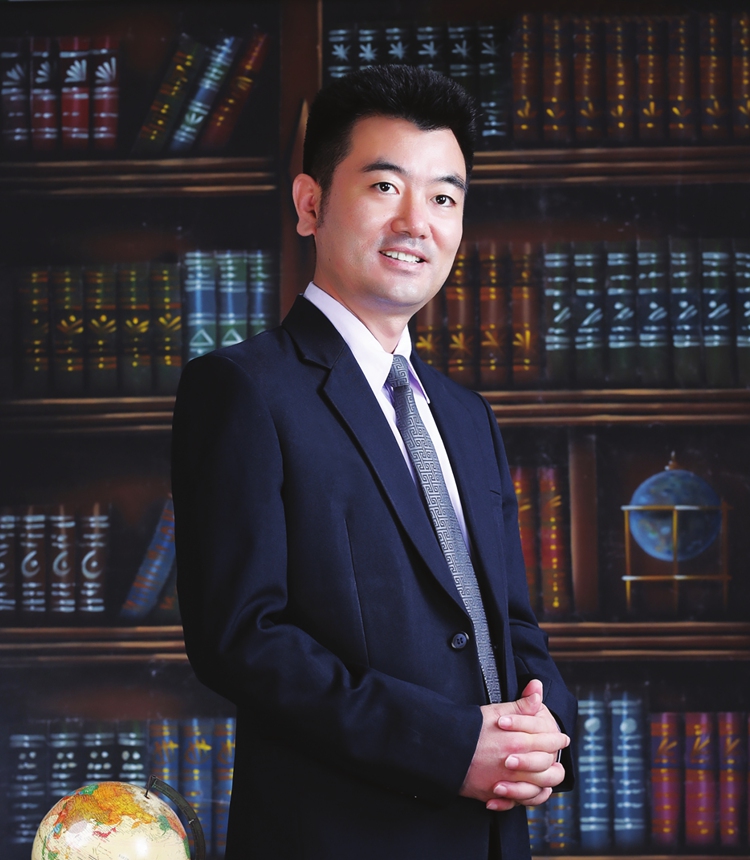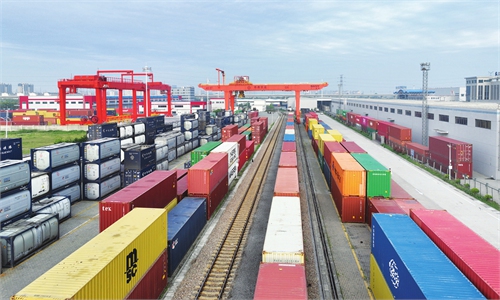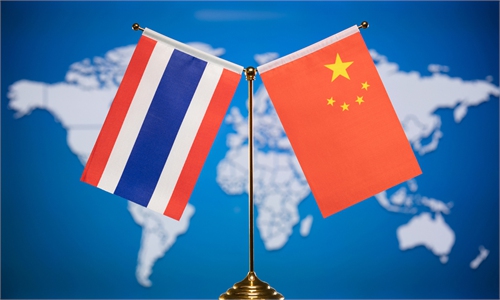BRI offers ASEAN great opportunities: Thai scholar
China is a true propeller of regional growth, contrasting West’s lip service

An elevated track, under construction as part of the Thai-Chinese Bangkok-Nong Khai high-speed railway project, in Nakhon Ratchasima province on March 29, 2023 Photo: VCG
Editor's Note:
This year marks the 10th anniversary of the China-proposed Belt and Road Initiative (BRI), a global cooperation platform that demonstrates China's vision for global development and offers solutions to the reform of the global governance system and multi-faceted challenges. Against this backdrop, the Global Times is publishing a series of interviews with renowned scholars, think tanks, and financial institutions, sharing their insights and understanding of how this initiative has earned global recognition and growing esteem. This is the eighth installment in the series.
Recently, Global Times reporter Li Xuanmin (GT) conducted an interview with Wirun Phichaiwongphakdee (Wirun), director of the Thailand-China Research Center of the Belt and Road Initiative and Researcher at the Thailand-China Strategic Research Center at the National Research Institute of Thailand. The interview focuses on the BRI and how the initiative has been facilitating trade and infrastructure connectivity in ASEAN (Association of Southeast Asian Nations). According to him, the China-proposed BRI has not only become a genuine driver of regional growth, but also provides a unique path of prosperity for ASEAN economies based on win-win cooperation.
GT: You're responsible for the translation to the Thai version of "Xi Jinping: The Governance of China II." While translating, what parts of the book impress you the most?
Wirun: I was impressed by all the concepts behind the BRI, which includes open and inclusive mutual learning, and the mutual benefit and win-win concepts. These concepts show China's unswerving push for global cooperation and a strong rejection of the zero-sum game, which makes China a leader in global development.
A decade ago, China proposed the far-reaching global initiative, and over the last 10 years, the China-proposed BRI has profoundly changed the world, providing genuine insight into the development of human society. Take the ASEAN as an example; the initiative has been constantly facilitating infrastructure connectivity between countries and regions along the road -- visibly through the China-Laos Railway which has since come into operation, the China-Thailand Railway, and the Jakarta-Bandung High-Speed Railway, which have brought prosperity and development opportunities to the ASEAN region.
GT: You just mentioned the benefits brought about by the BRI to the ASEAN. From your perspective, how does the region embrace the development opportunities facilitated by the initiative? And what are the initiative's development prospects in the ASEAN over the next decade?
Wirun: For me, personal experience speaks more than figures and data. The ASEAN economies not only have joined the BRI and tapped into massive growth opportunities, but more importantly, we endorsed China's development philosophy manifested in the initiative.
In the past, most ASEAN countries used to draw upon the Western development path, relying on a resource-driven model to propel their economies. But such a path of development is not sustainable. Meanwhile most ASEAN countries, which are also developing economies, lack complete industrial chains and manufacturing systems. But the rise of China and the various global initiatives it brought about has illuminated a unique model that is perfectly applicable to other Asian economies.
It is noticeable that China's rise is not build upon sacrificing neighboring countries' interests, which is in stark contrast to the capital accumulation stage of Western countries. The China-Laos Railway and the Jakarta-Bandung High-Speed Railway are both vivid manifestations of the Chinese way of modernization. At the same time, the China-Thailand Railway is being built. The three railway routes, along with others being planned, will serve as great boosters to the connectivity of the ASEAN and the Indo-China Peninsula. It is also further demonstrates how China and the ASEAN are working together to build a community of shared future.
Now, most ASEAN countries still struggle with post-COVID economic recovery. Meanwhile, factors such as certain Western countries' unilateral sanctions, non-traditional security threats and poverty, have curtailed the development potential of ASEAN countries. So it is of vital importance that, in the next decade, the development of the BRI should help build more consensus, maintain peace, and allow more countries to participate in the building of a community of shared future for mankind.
GT: This year marks the 10th anniversary of the BRI. In your perspective, how have economic ties between China and Thailand been developing under the initiative?
Wirun: The creation of the BRI has enabled Thailand to get on to the fast track of China's economic development. During the last 10 years, millions of Chinese tourists have visited Thailand, making our tourism sector display an unprecedented vitality since 1997. The booming tourism sector has also deepened bilateral, cultural, and people-to-people exchanges.
"China and Thailand becoming members of the same family" has become the common aspiration of people in the two countries. There are also multiple frameworks that consolidate the cooperation foundation, including the RCEP, and the Lancang-Mekong Cooperation.
In the future, bilateral cooperation under the BRI is expected to further expand to technology, innovation, digital economy and new energy manufacturing sectors. China-made new-energy vehicles (NEV) are now extremely popular in Thailand. Also, non-major oil producing countries face the common issue of energy insecurity, so it is expected that energy cooperation will become another hotspot for China-Thailand cooperation.

Wirun Phichaiwongphakdee, director of the Thailand-China Research Center of the Belt and Road Initiative Photo: Courtesy of Wirun Phichaiwongphakdee
GT: As part of its geopolitical game in Asia, the US has pushed for its Indo-Pacific strategy to curb the so-called China influence. The US has also strengthened interactions with ASEAN members in political, military and other fronts, attempting to drive a wedge between China and the ASEAN. What is your take on the US' scheme?
Wirun: It seems like some Western countries have gone to great lengths to maintain their hegemonic position on the global stage, even at the cost of instigating divisions and even conflicts. But what the ASEAN economies and other parts of the world need are cooperation and development, which are incorporated in the concepts and initiatives China has put forward. We welcome competition, but not in the form of veering into confrontation.
China is not only the creator of mutually beneficial concepts, but also a true propeller of regional development, which are in stark contrast to some countries' empty promises. I would suggest that some countries not interfere and create chatter while interfering in China-ASEAN cooperation, because we know what is best for us.
GT: Some Western countries have been calling for "de-risking" with China, a move which observers said is another geopolitical word play to contain China's rise. What is your thought on the rhetoric?
Wirun: China's cooperation with other countries, regardless of the ASEAN, Europe, or other Western economies, does not contain any risks but only holds development opportunities. For example, China's cooperation with the ASEAN is based on different resource advantages, and their industrial chain cooperation has already proven to be a win-win result. Chinese manufacturing investment has made active contributions to the development of ASEAN countries, and, China was also the largest source of foreign investment in Thailand in 2022.
The countries that hype up "de-risking" rhetoric always reflectively think that the strengthened cooperation with China would give the world, including the ASEAN, a chance to shake off their monopoly on the global stage, so they attempt to rope in more countries to resist such beneficial cooperation with China. Such moves lay bare their hegemonic mindset.



